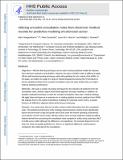Utilizing uncoded consultation notes from electronic medical records for predictive modeling of colorectal cancer
Author(s)
Hoogendoorn, Mark; Moons, Leon M.G.; Numans, Mattijs E.; Szolovits, Peter
DownloadSzolovits_Utilizing uncoded.pdf (507.3Kb)
PUBLISHER_CC
Publisher with Creative Commons License
Creative Commons Attribution
Terms of use
Metadata
Show full item recordAbstract
Objective
Machine learning techniques can be used to extract predictive models for diseases from electronic medical records (EMRs). However, the nature of EMRs makes it difficult to apply off-the-shelf machine learning techniques while still exploiting the rich content of the EMRs. In this paper, we explore the usage of a range of natural language processing (NLP) techniques to extract valuable predictors from uncoded consultation notes and study whether they can help to improve predictive performance.
Methods
We study a number of existing techniques for the extraction of predictors from the consultation notes, namely a bag of words based approach and topic modeling. In addition, we develop a dedicated technique to match the uncoded consultation notes with a medical ontology. We apply these techniques as an extension to an existing pipeline to extract predictors from EMRs. We evaluate them in the context of predictive modeling for colorectal cancer (CRC), a disease known to be difficult to diagnose before performing an endoscopy.
Results
Our results show that we are able to extract useful information from the consultation notes. The predictive performance of the ontology-based extraction method moves significantly beyond the benchmark of age and gender alone (area under the receiver operating characteristic curve (AUC) of 0.870 versus 0.831). We also observe more accurate predictive models by adding features derived from processing the consultation notes compared to solely using coded data (AUC of 0.896 versus 0.882) although the difference is not significant. The extracted features from the notes are shown be equally predictive (i.e. there is no significant difference in performance) compared to the coded data of the consultations.
Conclusion
It is possible to extract useful predictors from uncoded consultation notes that improve predictive performance. Techniques linking text to concepts in medical ontologies to derive these predictors are shown to perform best for predicting CRC in our EMR dataset.
Date issued
2016-03Department
Massachusetts Institute of Technology. Computer Science and Artificial Intelligence LaboratoryJournal
Artificial Intelligence in Medicine
Publisher
Elsevier
Citation
Hoogendoorn, Mark et al.“Utilizing Uncoded Consultation Notes from Electronic Medical Records for Predictive Modeling of Colorectal Cancer.” Artificial Intelligence in Medicine 69 (May 2016): 53–61 © 2016 Elsevier B.V.
Version: Author's final manuscript
ISSN
0933-3657